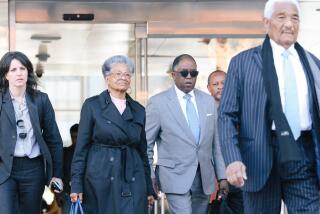No Prison Time Recommended in Honig Case
- Share via
SACRAMENTO — Probation officers have recommended that, rather than be sent to prison for his felony conflict-of-interest convictions, suspended state schools chief Bill Honig be required to serve 1,000 hours of community service.
The Sacramento County Probation Department is also recommending that Honig pay a $10,800 fine and be placed on probation, according to defense attorney Hugh Levine, who received a copy of the report this week.
Superior Court Judge James L. Long has the option Wednesday of ignoring the probation report and sentencing Honig to up to five years in the state penitentiary.
The state attorney general’s office, which prosecuted the case, would not comment. But Levine and another source said prosecutors would not object if Honig is sentenced to community service rather than prison.
Levine contends that 1,000 hours of community service is too harsh a penalty and that Honig’s felony convictions should be reduced to misdemeanors.
“I think it’s totally unnecessary,” Levine said of a community service sentence. “Anybody that knows Bill Honig knows that he has given of himself unstintingly to community service his entire adult life.”
A jury Jan. 29 found Honig guilty on four counts of conflict of interest in connection with his authorization--as superintendent of public instruction--of $337,509 in state contracts that benefited his wife’s nonprofit Quality Education Project. The money was used during the mid to late 1980s to hire educators who did parental involvement work in school districts in conjunction with QEP, which paid Nancy Honig about $100,000 in 1989.
In a motion this month seeking a reduction of the convictions to misdemeanors, defense attorneys argued that “although shamed, chagrined, stripped of his office, Bill Honig continues to want to serve others, and the court should not, through the stigma of a felony sentence, foreclose his ability to serve.”
Honig had said during his trial that he was the victim of a right-wing conspiracy and after the verdict said he still believed that he had done nothing wrong. But defense attorneys argued in their motion that Honig now realizes it was wrong to authorize the contracts.
“The jury’s verdict has educated him in a profound way,” the lawyers wrote. “He now appreciates that, where a public trust is concerned, the mere perception of conduct which tempts dishonor is as forbidden as actual dishonor.”
But prosecutors were not persuaded that Honig has had a change of heart and, in a scathing reply to the defense motion, advised Long to compare the former schools chief with “every criminal” who tries to avoid justice.
“He has blamed his conviction on the prosecution, the court’s rulings and misplaced reliance on the advice of staff,” wrote Deputy Atty. Gen. Cynthia G. Besemer in a court document filed this week.
“The court should consider whether any contrary statements at the time of judgment are the result of a sincere change of heart or simply the same contrition every criminal feels when he has been caught violating the law.
“This defendant forgot he was subject to the law, not above it,” Besemer wrote. “The defendant has no more insight today than he did any day during the years his mandated contracts were in effect.”
More to Read
Sign up for Essential California
The most important California stories and recommendations in your inbox every morning.
You may occasionally receive promotional content from the Los Angeles Times.













